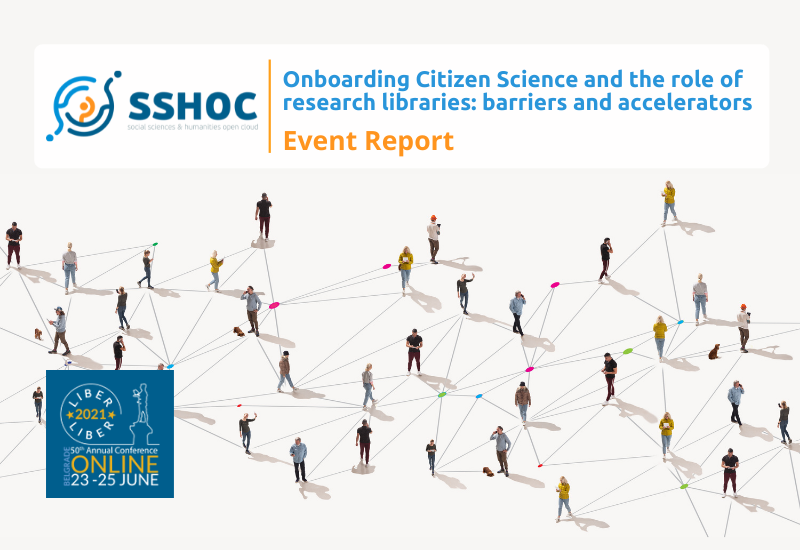
- Social Sciences & Humanities Open Cloud
Onboarding Citizen Science and the role of research libraries: barriers and accelerators - Post Event Report

Date:
06 August 2021
The workshop Onboarding Citizen Science and the role of research libraries: barriers and accelerators took place on June 23rd 2021 during the LIBER 2021 Annual Conference, which was held online for the second year.
The workshop built on the outcomes of the session “Citizen Science: What it means for SSH and how can multidisciplinarity be achieved?” that took place during the conference “Realising the European Open Science Cloud: Towards a FAIR research data landscape for the social sciences, humanities and beyond.” in November 2020. Taking the results and questions from the previous session to a second level, the workshop aimed at raising awareness on the challenges and opportunities deriving from libraries’ active involvement in Citizen Science in general, but also more specifically in relation to Social Sciences and Humanities. The role of the current workshop is to discuss how to advance SSH progress through participatory research with the help of the research libraries, by identifying barriers and accelerators. Synergies and collaborations will be discussed between the initiatives represented by the speakers and the participants and links between Citizen Science, SSHOC and the EOSC will be further explored.
The session was co-organised by SSHOC and the LIBER Citizen Science working group, while it hosted the sharing of best practices and current research on behalf of the COESO project, the University of Bordeaux and the INOS project, the SDU Citizen Science Knowledge Centre, Scientific Knowledge Services and Cos4Cloud.
The workshop devoted most of its duration to an interactive session with participants, who actively contributed to the discussion by sharing their experience, expertise and ideas.
Some highlights from the workshop:
- The SSHOC Key Exploitable Results, both focused on the SSH and multi-disciplinary ones, were presented.

- The COESO project, a framework for COllaborative Engagement on SOcietal issues, builds on the Hypotheses.org platform and aims at contributing to overcoming the obstacles that hinder the development of Citizen Science in the SSH, facilitating and supporting participatory research in SSH, through a service-first approach. Ten Citizen Science pilots will represent a variety of disciplines, societal challenges and types of engagement with citizens in different European countries. The development of the COESO's Virtual Ecosystem for Research Activation (VERA) framework aims at an early integration with physical spaces such as libraries. COESO project will also collaborate with research funding organizations to enhance financial support to Citizen Science. The VERA framework will upgrade OPERAS Research for Society service, currently based on Hypotheses platform, and bring its capacity to support participatory research up to the next level.

- The LIBER Citizen Science working group is actively contributing to Citizen Science for research libraries in collaboration with other stakeholders, in terms of skills, digital templates and partnerships, among others. It was stressed that libraries can play a critical part in facilitating citizen science. In this context, the working group is developing a Guide for Citizen Science for research libraries.

- The SDU Citizen Science Knowledge Centre is a partnership between library and faculty, bridging public and policies, helping researchers in gathering better data through Citizen Science projects. Participation happens in 4 levels: Crowdsourcing, Distributed Intelligence, Participatory Science and Extreme.

- The BESPOC model, presented by Scientific Knowledge Services, is a prototype for a single point of contact for Citizen Science, designed as a system of portals, frameworks, reports and connections, creating a digital desk to support the engagement of citizens. Ultimate goal is to provide the tools building a community of curious minds that responds to the need for new ideas, broader geographical penetration, and more resources than funders can provide.

- The INOS project aims at integrating Open and Citizen Science in active learning approaches in higher education. It does so through connectivity & modernity, mixing participants and mentors, community building & pedagogical innovation & challenge-based learning. University of Bordeaux (UBx) participates in the project providing their expertise in open innovation activities. UBx is a large multidisciplinary university in “transition” working notably on 2 roadmaps (environmental and societal, open science). It is engaged in a global and participative reflection for 2030: modernising scientific mediation, creating intermediate spaces & acculturating to participation.

- The Cos4Cloud project boosts Citizen Science technologies by building eleven user-centered services, which will be integrated in EOSC. Nine Citizen Science platforms are involved in the project to support sustainability and to increase the data quality and quantity, while the project implements co-designed sessions for the technological services and testing activities.

The workshop fulfilled its goal to discuss how to advance SSH progress through participatory research with the help of the research libraries, by identifying barriers and accelerators. Synergies and collaborations were discussed between the initiatives represented by the speakers and the participants and links between Citizen Science, SSHOC and the EOSC were further explored.

In the context of brainstorming with participants, speakers and organisers, a set of recommendations occurred around three areas:
1 - Point of contact – Libraries as community hubs:
- To create guidance materials for stakeholders in the model of the upcoming Citizen Science for Research Libraries - A Guide;
- Show how existing resources and tools can be adapted for Citizen Science (e.g. complying with ethical aspects);
- Implement a BESPOC;
- Create connections between stakeholders in a range of citizen science activities;
- Identify the end-users of the services.
2 - Awareness raising
- Share SSH projects (results and activities) with other SSH researchers;
- Highlight the different names/branding of Citizen Science.
3 - Linking to EOSC:
- Link to EOSC initiatives and highlight case studies to prove the added value and inclusiveness of Citizen Science.
The full programme and profiles of the speakers can be found here.
The presentations are available on Zenodo here and on YouTube here.
